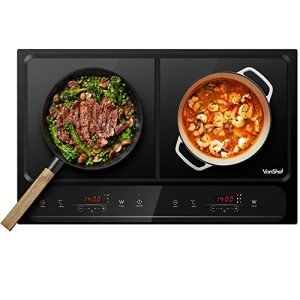Induction Hob Guide: A Comprehensive Overview
Induction hobs have emerged as a popular option for modern kitchens, transforming the way individuals cook. This guide will offer an extensive take a look at what induction hobs are, how they work, their advantages and downsides, and factors to consider when buying one.
What is an Induction Hob?
An induction hob is a type of cooktop that uses electromagnetic energy to heat pots and pans straight, instead of cooking through a flame or by heating up the surface of the cooktop. This technology is becoming progressively popular within both residential and commercial cooking areas due to its effectiveness and security features.
How Does an Induction Hob Work?
The concept behind induction cooking relies on electromagnetic induction. Here's how it works:
- Electromagnetic Field: When the induction hob is turned on, it generates an electromagnetic field underneath the cooktop surface.
- Material Response: If a ferrous (magnetic) product pot or pan is put on the hob, the electromagnetic field induces currents in the pots and pans.
- Heat Generation: These induced currents produce heat straight in the pot or pan, cooking the food within. The hob surface remains cool to the touch given that it is not being warmed straight.
Advantages of Using an Induction Hob
Induction hobs include a wide variety of benefits:
- Energy Efficiency: Induction cooking is extremely effective as nearly all the energy produced is moved straight to the pot or pan, leading to faster cooking times.
- Safety: The surface area of the induction hob stays cooler, minimizing the threat of burns. Additionally, induction hobs shut off instantly when cookware is gotten rid of.
- Accurate Temperature Control: Users can quickly change the heat settings, providing better control over cooking temperature levels.
- Easy to Clean: Because the induction hob itself does not get exceedingly hot, spills are less likely to burn onto the surface, making cleaning up a breeze.
- Modern Aesthetics: Induction hobs usually are available in sleek, flat designs that fit well in modern kitchen areas, boosting the general visual.
Drawbacks of Induction Hobs
While there are many advantages, it is also crucial to think about some disadvantages:
- Cost: Induction hobs are typically more expensive than conventional gas or electric cooktops.
- Cookware Compatibility: Specialized cookware is required; only ferrous pots and pans will deal with induction hobs, meaning some pots and pans may require to be changed.
- Sound: Some users report a buzzing or humming noise when utilizing induction cooking, especially at high settings.
- Power Limitations: Induction hobs may require specific electrical setups and can not be used with standard outlets if they have high power requirements.
Secret Features to Consider When Buying an Induction Hob
When thinking about acquiring an induction hob, it's crucial to assess several elements to guarantee you make the best choice for your kitchen area.
| Feature | Description |
|---|---|
| Size | Select a design that fits your cooking area space and satisfies cooking needs (2-5 burners). |
| Power Output | Try to find higher wattage for quicker heating but make sure compatibility with your power supply. |
| Control Type | Choose between touch controls or knobs, based on your preference for ease of usage. |
| Safety Features | Inspect for automatic shut-off, child locks, and residual heat indications. |
| Style | Choose a design that complements your cooking area decoration-- think about an integrated versus a counter top. |
| Warranty | Confirm the warranty provided-- longer warranties suggest much better item guarantee. |
FAQ
Can I use any pot or pan on an induction hob?
No, only cookware made of ferrous metals, such as cast iron or some stainless steel, will work on induction hobs. Induction Hob Specifications , glass, and copper cookware are not suitable unless they have a magnetic base.
How does induction cooking affect cooking times?
Induction cooking is generally faster than gas or electrical cooking, as it directly heats up the pots and pans and not the cooktop. The majority of users report significant time savings when boiling water or cooking meals.
Is induction cooking safe for kids?
Yes, induction hobs are thought about safe for children. The primary surface remains cool, and the hob immediately turns off when cookware is removed, lowering the danger of burns or fire.
Do induction hobs require special electrical setups?
Some induction hobs might require a devoted electrical outlet in order to function properly, specifically those with greater power output. It is vital to consult an electrical contractor if you are uncertain.
Induction hobs represent a considerable development in cooking innovation, delivering efficiency, speed, and safety advantages over traditional cooking methods. While there are considerations to bear in mind, such as expense and cookware compatibility, the benefits can surpass the drawbacks for numerous users. As home cooking continues to develop, induction hobs make certain to be at the leading edge of modern culinary technology.
Whether you are a culinary novice or a knowledgeable chef, comprehending how induction hobs work and what to search for when buying one can greatly improve your cooking experience. By weighing the advantages against the disadvantages and considering your particular requirements, you can make an informed decision that will raise your cooking to brand-new heights.

